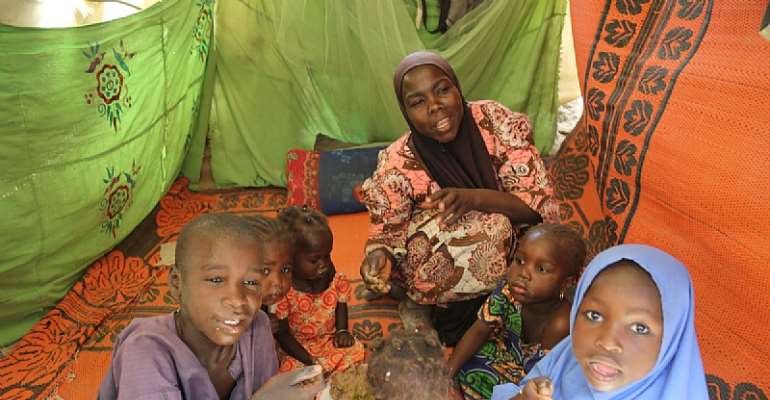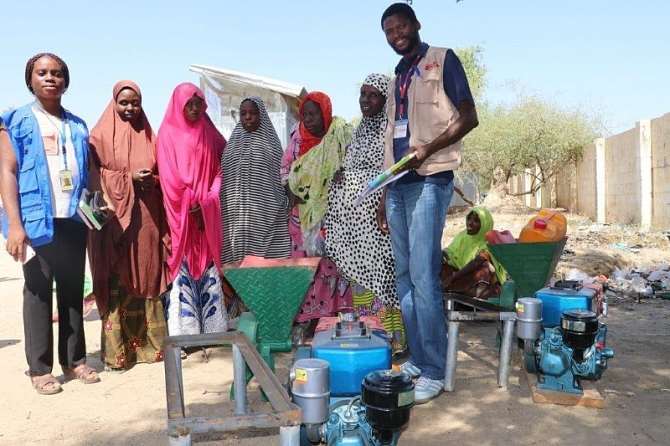The price of safety in Nigeria’s deadly conflict

After fleeing an upsurge in violence in December, thousands of people eke out a living in Monguno, Northeast Nigeri
For three weeks, home for Zarah Modu has been a cavernous tent that serves as a reception centre for internally displaced people (IDPs) arriving in the town of Monguno. There is no privacy here. Men, women and children sleep together in the same space, something totally alien to the culture of this region. Zarah’s two sons, four and three, lie sprawled across her, fast asleep in the stifling heat. They are among the latest victims of the long-running conflict in Nigeria’s northeast, which has driven close to 2 million people from their homes over the past decade.
When fighting escalated around Kukawa in November 2018, Zarah heard that thousands of people were fleeing. She thought she was safe in her village just outside the town.
“Fighters came one day. They told us to leave and started to burn our homes. We just ran. I got separated from my husband. I still don’t know what has happened to him,” says Zarah, who was nine months pregnant at the time.
Monguno was the closest town along the way. After a day of walking through the bush, she could go no further. She had to beg food for her boys. Luckily, she managed to get a lift in a pick-up from some men who were collecting firewood.
Reaching Monguno after two days of travel, Zarah was exhausted. The town was full of new arrivals. Some were camped by the roadside while others had merged into camps dotted around the town. Over 80 per cent of those arriving were women and children.
Zarah spent a night on the roadside at a military checkpoint where people were being screened before being allowed into the town. That night, she went into labour. In state of distress, she was noticed by some passing UN aid workers who took her to a local clinic. Thirty-six hours later she gave birth to a baby boy. Tragically, her newborn son died within hours from complications resulting from the stress of Zarah’s ordeal. Now she is recovering her strength at the reception centre.
Between November and February 2019, the population in Monguno’s 12 IDP camps swelled by over 18,000. Most were new arrivals from Kukawa, Baga and surrounding areas.
“At the peak of the crisis in December, we had over 500 people arriving here each day. The place was overflowing,” explains Abdulaziz Shariff, from INTERSOS, the non-governmental organization which manages the reception centre.
“People left their homes in a hurry. Most travelled on foot carrying very few possessions. I didn’t see anyone arrive here with food,” he says.
Now, daily arrivals fluctuate between 25 and 40. Most have been relocated to the camps dotted around the periphery of the town, which also house long- term IDPs who arrived from other areas of Borno State up to five years ago.
The only possession Zarah had when she arrived was a five-litre plastic jerrycan for carrying water. The other women in the shelter share their cooking pot, so she can prepare the food rations given to her by the UN World Food Programme (WFP), which stepped in to provide emergency rations to the new arrivals.
Since 2016, WFP has been working in Monguno with local partners, providing a lifeline to 40,000 people. The assistance comes in the form of vouchers that can be exchanged with local traders for a monthly ration of basic food items. Now the caseload exceeds 50,000.
“The markets are functioning well in Monguno, so vouchers are an effective way to support the local economy while also giving people choice in the food they buy,” explains Myrta Kaulard, Country Director with WFP.
WFP has also expanded its nutrition programme and is providing fortified cereal to almost 33,000 pregnant and nursing women and young children, who are at risk of malnourishment.
Fortified cereals provided by WFP are boosting the nutrition of children. Photo: WFP/Patrick Fuller
Despite the military presence, many here don’t feel safe. Lack of space means that some of the new arrivals are having to live close to the protective trench that encircles Monguno. Incursions from fighters who lie close by are an ever-present threat. There was panic in December when the town was attacked and many humanitarian organizations had to temporarily withdraw.
Zarah was only meant to remain in the reception centre for 72 hours, but it’s likely she will be here longer due to overcrowding in the camps. Many families have been here for months, but finding available land to build more shelters is challenging.
Providing adequate infrastructure in the camps is also a challenge. Water here is a highly valued commodity due to its scarcity. The few boreholes that exist in the camps struggle to produce enough for the growing numbers of residents. Plastic jerrycans snake in long queues from the wells. They have been left by their owners who return throughout the day to move them up the line.
Seen from the air, the camps in Monguno appear to be taking over the town. Ordered grids of single-roomed shelters, their tin roofs glinting in the sun, stand out among the local mud brick houses.
Some of the new arrivals appear to have fallen between the cracks. Barely 100 metres from the reception centre, 54-year-old Osman Haske and his family are camped out in the shell of an abandoned house. With no roof, the family is exposed to the elements. Osman arrived in Monguno with 40 other families when fighting flared up in his hometown of Baga. He says he was never aware that he needed to register at the reception centre , which is the first step towards receiving humanitarian assistance.
“We found this place when we first arrived. It was being used as a toilet by local people and it took us four days to clean it out. Since then we’ve been surviving day-by-day. My main worry is how we will manage here when the rains come in a few weeks.”
The Milling Machines are improving the lives of families in Borno State
Osman’s family is comparatively lucky. Outside, are scattered a handful of flimsy shelters which offer scant shade to the huddle of women and children trying to hide from the searing midday sun. Made from scraps of tattered material strung over sticks planted in the sand, the shelters have the impermanence of play-houses made by children. But for the past four months they have been homes. Toma Mohammed and her neighbour Amina Umaru live here. The vicious conflict playing out in Borno has left both of them deeply scarred.
65-year-old Amina saw her husband shot and killed when fighters attacked Baga. During the attack her son disappeared and she hasn’t seen or heard from him since. Amina managed to hide with her granddaughter, risking her life to return at night to bury her husband in accordance with Islamic tradition, before fleeing to Monguno.
Toma managed to escape Baga with her husband, six children and four grandchildren. The conflict first came to her village seven years ago when her eldest daughter was kidnapped as she went to collect water one morning from the village hand pump. Then, in November last year she suddenly re-appeared, together with two children resulting from a forced marriage with a fighter. But her daughter returned in poor health and the journey from Baga to Monguno proved too arduous for her. Last week she was admitted to the local hospital and the prognosis is not good. Toma is fearful she won’t come out alive.
Tragedy continues to stalk Toma. The simple act of gathering firewood here can have deadly consequences. Last month, one of her brothers was killed when he ventured outside the perimeter trench to cut wood from the bush.
“My husband still goes. I worry because Boko Haram are out there. It’s a big risk but the wood he collects is our only source of income,” she says.
Earning a livelihood is particularly difficult for IDPs in Monguno. Many used to rely upon farming but there is no spare land to cultivate. Few have the resources to enter into petty trading or start small businesses. While security remains precarious, most depend upon their monthly food voucher from WFP.
A tailoring business established by IDPs in one of the camps. Photo: WFP/Patrick Fuller
At the reception centre, women are being enrolled in weaving classes run by a local organisation. A group of 20, young and old, are learning to make an assortment of baskets and hand fans. As well as learning new skills, they are given tools and materials which should enable them to start generating some income for their families.
19-year-old Rukayya Abatcha, arrived here from Baga in December. She exudes the confidence of someone twice her age and has taken responsibility for organizing the participation of other women from the community in the project.
“This class provides us with a safe space where we can come together as women and forget about the stresses and worries that we are carrying. Bad things have happened to many of us,” says Rukayya.
Rukayya witnessed the killing of four of her uncles who refused to join the fighters when they came to recruit men from her neighbourhood. Now, she has started a new life and is the sole breadwinner for her husband and young daughter. She also looks after her neighbour in the reception centre, an elderly woman who is mentally handicapped.
“I can now make up to nine dollars a week making fans,” says Rukayya. “I will use this money for my family and also to help my neighbour. She has no-one else to care for her.”
Rukayya exemplifies the remarkable resilience of people here. Lives have been thrown into turmoil by this conflict. Many have witnessed extreme levels of brutality, violence or cruelty. Yet the kinship and bonds that exist between people, and their capacity to help each other regardless of individual circumstances, remains undiminished.

